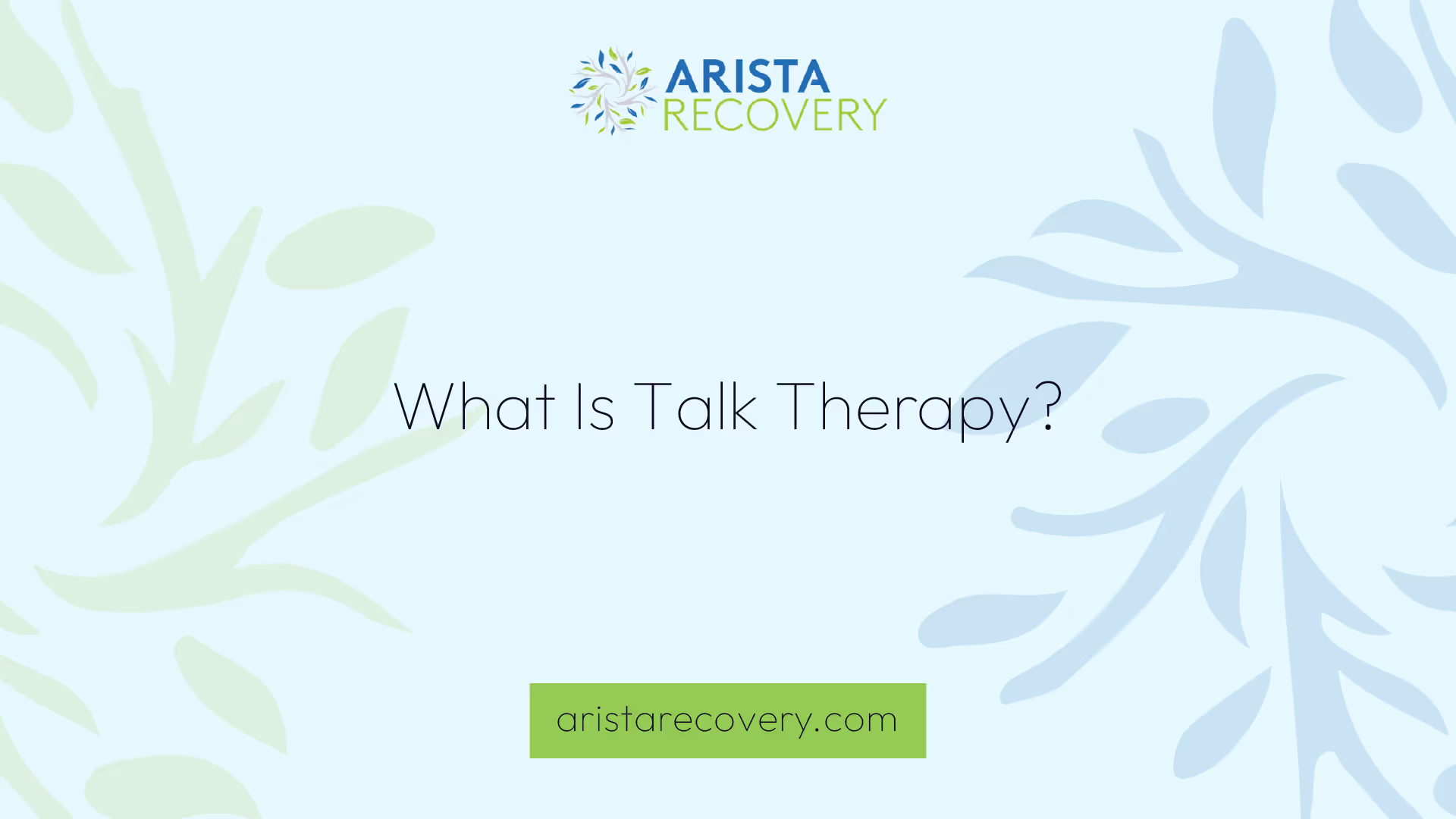
What Is Talk Therapy?
Understanding Talk Therapy
To unlock the secrets of emotional well-being, it's essential to understand what talk therapy is and how it can be used.

Definition of Talk Therapy
Talk therapy, also known as psychotherapy, involves meeting with a therapist and exploring challenges through confidential conversations. These conversations can take place either one-on-one or in a group format. The main goal is to provide a safe, non-judgmental space to express thoughts and feelings, and resolve emotional and psychological challenges [1].
During these sessions, therapists employ various techniques to address challenges faced by the individual. These may include identifying past experiences, recognizing patterns, and establishing coping strategies and healthy behaviors. Different types of talk therapy include cognitive behavioral therapy (CBT), behavioral therapy, and more.
Common Uses of Talk Therapy
Talk therapy is commonly used to help with a variety of issues such as anxiety, depression, interpersonal difficulties, stress management, and self-esteem, among others.
The therapeutic technique can benefit various conditions that interfere with a person's daily life. These include anxiety, depression, stress, phobias, and post-traumatic stress disorder (PTSD), among others.
The therapy sessions often involve mental health professionals communicating with patients to help identify issues causing emotional distress. They are also used as psychological treatments aimed at addressing mental and emotional issues through interactions with trained therapists. These interactions can take place in various formats, including individually, in groups, online, over the phone, with family, or with partners [4].
In summary, talk therapy is a versatile tool in the world of mental health, capable of addressing a wide range of mental and emotional issues. The therapy's flexibility in approach, combined with the expertise of trained therapists, provides a secure platform for people to explore their feelings, confront their fears, and live healthier, happier lives.
Methods of Talk Therapy
There are various methods or types of talk therapy, each with its unique approach and treatment focus. This section explores three widely recognized and employed forms: Cognitive Behavioral Therapy (CBT), Psychodynamic Therapy, and Group Therapy.
Cognitive Behavioral Therapy (CBT)
Cognitive Behavioral Therapy (CBT) is a type of talk therapy that aims to explore the relationships between thoughts, feelings, and behaviors. It is centered on the premise that by identifying unhealthy thought patterns, individuals can develop healthier ways of thinking. This, in turn, leads to positive behavior patterns and beliefs.
CBT is typically used to treat various mental disorders, including:
- Depression
- Borderline personality disorder
- Anxiety disorders
- Phobias
- Post Traumatic Stress Disorder (PTSD)
- Sleep disorders
- Eating disorders
- Obsessive-compulsive disorder (OCD)
- Substance use disorders
- Bipolar disorders
- Schizophrenia
- Sexual disorders
CBT is the most frequently used approach for treating anxiety disorders, emphasizing the role of thinking in how we feel and what we do. It is also commonly used to treat depression. It has been found to be the most consistently supported psychotherapeutic option for treating anxiety disorders, making it the most recommended approach.
Psychodynamic Therapy
Psychodynamic therapy is a therapeutic treatment that guides individuals to explore unresolved issues and conflicts, and to understand the impact of past relationships on current behavior. It helps patients understand and resolve their problems by increasing awareness of their inner world and its influence over relationships both past and present.
While psychodynamic therapy is rooted in the theories of psychoanalysis, it is less intensive and can be beneficial for individuals dealing with a range of mental health disorders or emotional difficulties.
Group Therapy
Group therapy is a form of therapy where one or more therapists treat a small group of clients together as a group. This type of therapy provides individuals a safe and supportive environment to share their thoughts and feelings, gain insights from others with similar experiences, and learn practical strategies to manage their symptoms.
Group therapy can be particularly beneficial for individuals dealing with similar issues, such as addiction, grief, or social anxiety, as it helps them understand that they are not alone in their struggles. The interactive and communal nature of group therapy can lead to impactful personal growth and significant therapeutic change.
Successes and Risks of Talk Therapy
An important part of understanding what is talk therapy involves examining its potential benefits and drawbacks. This allows individuals to make informed decisions about whether this type of therapy aligns with their personal needs and circumstances.
Positive Outcomes of Talk Therapy
Research robustly supports the effectiveness of talk therapy in treating a variety of mental health conditions. Studies indicate that early treatments can significantly reduce long-term risks for serious mental health conditions, especially for individuals experiencing bereavement.
Furthermore, cognitive behavioral therapy (CBT), a common form of talk therapy, is the most consistently supported psychotherapeutic option for treating anxiety disorders and can also provide significant relief for depression. Interestingly, the latest stats revealed that CBT, often combined with guided self-help books, was reported to be the most common form of therapy given (72.7%) during 2021-22.
Another notable success of talk therapy lies in the realm of online therapy. This modality has gained popularity and has been shown to be as effective as face-to-face treatment for conditions like depression and anxiety. Online cognitive-behavioral therapy, in particular, has been reported as cost-effective and associated with a reduction in anxiety symptoms.
Potential Risks and Downsides
While there are many positive aspects of talk therapy, it's crucial to also be aware of potential risks and downsides. Some clients initially feel worse as therapy progresses, and in rare cases, may experience thoughts of self-harm. Strong emotions towards therapists are common, particularly in longer therapies.
Moreover, therapy has the potential to complicate life by bringing about changes in lifestyle and relationships. There's also a financial cost involved, although health insurance may cover some expenses. It's worth noting that insurance companies may require therapists to provide a diagnosis using approved criteria, such as DSM-5 or ICD-10, and may request reports outlining the treatment plan's duration and goals.
If therapy does not seem effective after several weeks or months, clients are encouraged to engage with their therapists to consider alternative therapy approaches or therapists [7].
In conclusion, the success and risks of talk therapy can vary greatly depending on individual circumstances. However, with the right approach and a strong patient-therapist relationship, talk therapy can be an effective tool for managing and overcoming mental health challenges.
Talk Therapy for Specific Conditions
Talk therapy, also known as psychotherapy, is a method of addressing various mental and emotional challenges through conversations with a trained therapist. This form of therapy is useful in treating a wide range of conditions, including anxiety, depression, relationship issues, and stress management. By discussing these issues openly, individuals can gain new insights, develop coping strategies, and enhance their emotional well-being.
Talk Therapy for Anxiety and Depression
Anxiety and depression are two common conditions where talk therapy plays an integral role in treatment. It provides a safe and supportive environment for individuals to express their feelings, identify triggers, and learn effective ways to manage their thoughts and emotions. Therapists can offer various strategies to help individuals cope with anxiety and depression, including relaxation techniques, mindfulness exercises, and cognitive-behavioral methods. Over time, talk therapy can lead to significant improvements in mood, functioning, and overall quality of life [2].
Talk Therapy for Relationship Issues
Relationship issues can cause significant emotional distress and interfere with daily life. Talk therapy offers a platform for individuals and couples to explore their feelings, understand patterns in their relationships, and develop healthier ways of interacting. Whether these issues are related to communication, trust, intimacy, or conflict resolution, a skilled therapist can provide guidance and facilitate meaningful conversations. In many cases, talk therapy can strengthen relationships and enhance interpersonal dynamics [3].
Talk Therapy and Stress Management
In today's fast-paced world, stress is a common issue that can negatively impact mental and physical health. Talk therapy can be an effective tool for managing stress. Through discussions with a therapist, individuals can identify sources of stress, explore their reactions, and learn coping strategies. Techniques may include relaxation exercises, time management tips, and cognitive restructuring methods. By implementing these strategies, individuals can better manage stress, improve their resilience, and enhance their overall well-being.
In all these cases, the effectiveness of talk therapy is largely dependent on the individual's willingness to engage in the process, the rapport with the therapist, and the application of learned strategies. It's also worth noting that while talk therapy can be highly beneficial, it is not a quick fix and requires time, effort, and commitment to yield positive results.
Navigating the Process of Talk Therapy
Starting the journey of talk therapy can seem daunting, but understanding the process can make it less intimidating. Let's explore the initial steps in talk therapy, the importance of the patient-therapist relationship, and the emerging world of online therapy options.
Initial Steps in Talk Therapy
For individuals considering talk therapy, the first step does not necessarily require a diagnosis. However, having a diagnosis may be necessary for insurance coverage of therapy appointments.
The initial steps involve speaking with potential therapists, asking questions, and exploring different therapy options. It is crucial to find a mental health professional who can help identify issues causing emotional distress, such as anxiety, stress, or depression. This professional can guide the therapeutic process, which can significantly improve how individuals feel and change their outlook on life.
The Patient-Therapist Relationship
The success of talk therapy largely depends on the quality of the patient-therapist relationship. It's vital for the individual to be open to the process and honest about their feelings. A good therapist listens, challenges negative thoughts and feelings, respects boundaries, and always has the client's best interests at heart.
If there is no noticeable improvement after the initial sessions, it may be beneficial to consider trying a different therapist. Finding the right fit is an essential part of the therapeutic journey and can significantly impact long-term mental health outcomes.
Exploring Online Therapy Options
In recent years, online therapy has gained popularity as an alternative to traditional face-to-face sessions. Research shows that online therapy can be as effective as in-person treatment for conditions like depression.
Online cognitive-behavioral therapy, in particular, has been found to be cost-effective and associated with a reduction in anxiety symptoms. This option provides the flexibility to undergo therapy in the comfort of your own home, making it a convenient choice for many.
In conclusion, understanding the process of talk therapy, including the initial steps, the importance of the patient-therapist relationship, and the availability of online therapy options, can help individuals navigate their therapeutic journey more effectively. As always, the goal of talk therapy is to improve one's emotional well-being and quality of life.
References
[1]: https://www.kmatherapy.com/blog/talk-therapy-pros-and-cons
[2]: https://www.medicalnewstoday.com/articles/talk-therapy
[3]: https://www.healthline.com/health/mental-health/talk-therapy
[4]: https://www.nhs.uk/mental-health/talking-therapies-medicine-treatments/talking-therapies-and-counselling/types-of-talking-therapies/
[5]: https://nyctherapy.com/therapists-nyc-blog/psychotherapy-what-type-of-talk-therapy-is-right-for-me/
[6]: https://relevancerecovery.com/blog/understanding-the-difference-cbt-vs-talk-therapy/
When mental health challenges and addiction intersect, it can feel isolating. At Arista, we offer compassionate, evidence-based, and trauma-informed care to help you heal, grow, and move forward.
You’re not alone in this.
When mental health challenges and addiction intersect, it can feel isolating. At Arista, we offer compassionate, evidence-based, and trauma-informed care to help you heal, grow, and move forward.
Support that moves with you.
You’ve taken a brave first step. At Arista Recovery, we’re here to help you continue with best-in-class care designed for long-term healing and support.
.webp)






